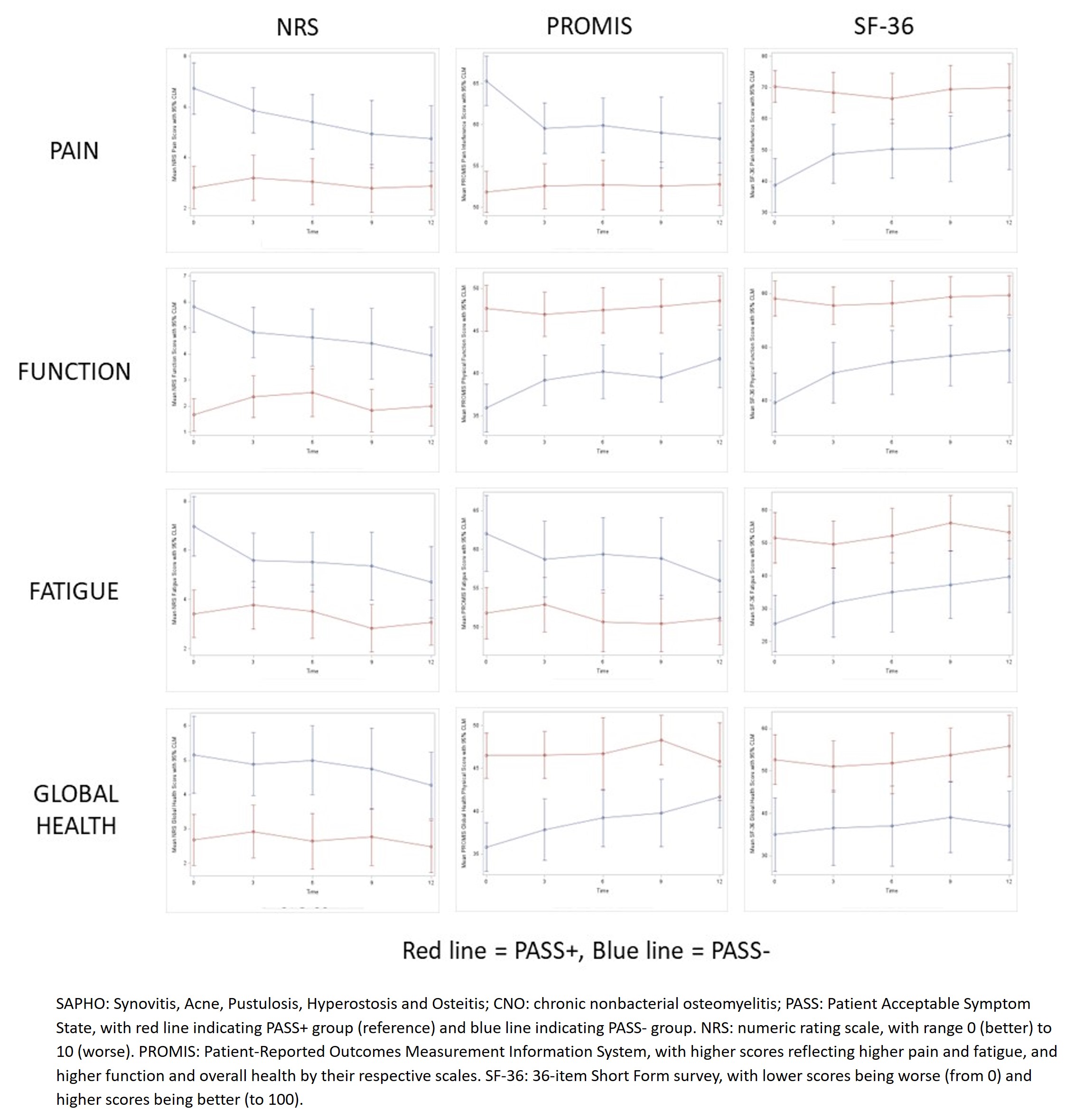Session Information
Date: Monday, October 27, 2025
Title: (1147–1190) Miscellaneous Rheumatic & Inflammatory Diseases Poster II
Session Type: Poster Session B
Session Time: 10:30AM-12:30PM
Background/Purpose: Patient symptoms are important in the assessment of disease activity. The Patient Acceptable Symptom State (PASS) is defined as the minimum symptom score beyond which patients consider themselves to be well. The PASS reflects symptom control from the patient’s perspective. We analyzed between group differences for PASS+ and PASS- subjects, and we performed a longitudinal response profile analysis and assessed validity of patient-reported outcomes (PRO) for PASS in adults with SAPHO-CNO.
Methods: Adults (≥18 years) enrolled in the SAPHO-CNO Study, a prospective longitudinal observational study, completed the PASS question: “Think about all the ways that your SAPHO/CNO has affected you during the last week. If you were to remain for the next few months as you were in the last week, would this be acceptable to you?”. The PASS has a binary response: acceptable (PASS+) or unacceptable (PASS-). We collected serial questionnaires on patient-reported disease activity (PATDAM) measured by the numeric rating scale (NRS, range 0-10), and PROs for pain, function, fatigue, and global health assessed by the patient NRS (range 0-10), 36-item Short Form survey (SF-36), and Patient-Reported Outcomes Measurement Information System (PROMIS) instruments. Subject baseline characteristics were summarized as means (standard deviation) or counts (proportion) stratified by PASS. We performed a response profile analysis with longitudinal modeling to account for both the mean and the covariance of repeated measures over time. We sought to characterize changes in the mean PROs over time, and to determine whether the mean outcome differs between PASS groups. Dependent variables (responses) were PRO measures; independent variables were time, group and time*group interaction term. Time was alternatively treated as categorical, linear, or quadratic, and model fit was evaluated by Akaike Information Criterion. All analyses were performed using SAS (v.9.4).
Results: Differences in baseline characteristics of PASS- and PASS+ subjects (n=59) are summarized in Table 1. PASS- subjects were slightly older at diagnosis, with a longer time to diagnosis and longer symptom duration. Spine involvement and skin features (PPP, acne) were more common, and mean PRO scores were higher in PASS- subjects. Mean response profiles for pain, function, and fatigue, but not global health, were significantly different between PASS groups (p < 0.05 for all time*group interaction terms) (Figure 1). Over time, longitudinal trajectories for all PROs remained stable in the PASS+ group, while they tended to improve in the PASS- group. Similarly, mean patient-reported disease activity (by PATDAM) was significantly different between PASS groups; it improved in PASS- subjects over time (p< 0.05) (Figure 2). Hence, PRO measures for pain, function and fatigue, demonstrate content validity, and PATDAM shows content and construct validity for disease activity as reflected by longitudinal changes in PASS groups.
Conclusion: The PASS identifies two distinct groups of adult SAPHO-CNO patients with differing levels of disease activity, pain, function and fatigue over time. We demonstrated the validity of PATDAM and key PROs with PASS longitudinally.
.jpg) Figure 1. Response Profile Analysis of Patient-reported Outcome Measures by the Patient Acceptable Symptom State group over 1 year of follow-up in Adults with SAPHO-CNO (n=59).
Figure 1. Response Profile Analysis of Patient-reported Outcome Measures by the Patient Acceptable Symptom State group over 1 year of follow-up in Adults with SAPHO-CNO (n=59).
.jpg) Figure 2. Response Profile Analysis of Patient-reported Disease Activity by the Patient Acceptable Symptom State group over 1 year of follow-up in Adults with SAPHO-CNO (n=59).
Figure 2. Response Profile Analysis of Patient-reported Disease Activity by the Patient Acceptable Symptom State group over 1 year of follow-up in Adults with SAPHO-CNO (n=59).
To cite this abstract in AMA style:
Lenert A, Domsic R, Thomason J, smith M, Lenert P, Zhao Y, Templin J, Vaughan-Sarrazin M, Solomon D, Ferguson P. Patient Symptom State Demonstrates Validity for the Assessment of Disease Activity and Patient-reported Outcomes in Adults with SAPHO and Chronic Nonbacterial Osteomyelitis – A Longitudinal Response Profile Analysis in The SAPHO-CNO Study [abstract]. Arthritis Rheumatol. 2025; 77 (suppl 9). https://acrabstracts.org/abstract/patient-symptom-state-demonstrates-validity-for-the-assessment-of-disease-activity-and-patient-reported-outcomes-in-adults-with-sapho-and-chronic-nonbacterial-osteomyelitis-a-longitudinal-re/. Accessed .« Back to ACR Convergence 2025
ACR Meeting Abstracts - https://acrabstracts.org/abstract/patient-symptom-state-demonstrates-validity-for-the-assessment-of-disease-activity-and-patient-reported-outcomes-in-adults-with-sapho-and-chronic-nonbacterial-osteomyelitis-a-longitudinal-re/

